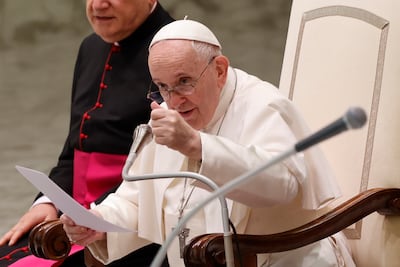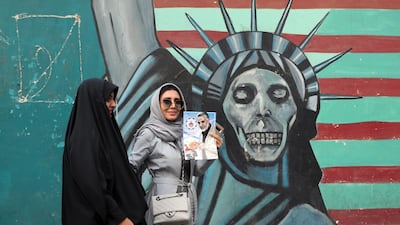The intensive preparation for a new nuclear deal with Iran continues, and it is sure to be a key part of CIA Chief William Burns's visit to Tel Aviv this week. Arab states, from the Gulf to Iraq and Lebanon, are unlikely to obtain more than verbal reassurances that a revival of the 2015 nuclear deal would not harm their interests, and that the end of oil and trade sanctions on Tehran would not give a boost to Iran's Islamic Revolutionary Guard Corps to continue its expansionist projects.
Israel, however, may get more. If it consents to the decisions of the administration of US President Joe Biden on Iran, it may be rewarded with strategic concessions. Those could include a commitment to enhancing Israel’s military edge in the whole of the Middle East, and allowing Israel to shape some red lines and boundaries for the new deal.
The UN Security Council five permanent member states – the US, China, Russia, Britain and France – plus Germany are eager to cut a deal with the Iranians and seem less concerned than they should be with the implications, including unlocking huge sums of money, which could be used for boosting Iran’s regional policies in Iraq, Lebanon, Syria and Yemen. Their chief concern, rather, is to prevent a massive military confrontation between Iran and Israel, directly or through Iran's proxy Hezbollah in Lebanon.
Skirmishes, however, appear more acceptable to them, even if they lead to the destruction of the political, economic and social fabric of Lebanon, and all the inhumane atrocities this entails. Such skirmishes may be viewed in a grand geopolitical context as a way to vent tension.
But that is morally bankrupt thinking. The international community ought to instead build on the mediation efforts of the Vatican and Pope Francis to save Lebanon, to put serious pressure on the European states and the Biden administration to end the disintegration of Lebanon’s sovereignty. There is also a dire need for a similar role to be undertaken by Ayatollah Ali Sistani in Iraq, who wields influence over the country's Popular Mobilisation Forces, another Iranian proxy. Today, the PMF has become an Iranian operator working against Iraqi sovereignty, and it is time to revoke that support before it is too late.
One Security Council permanent member, Russia, appears fully committed to a strong relationship with Iran, and sees this as vital for its national interests. Indeed, for Moscow, Iran is an indispensable ally in Syria, Iraq, Lebanon and elsewhere in the Middle East. The Kremlin sees in any US-Iranian accord and the revival of the nuclear deal immense benefits for Russia, from the lifting of the US arms embargo against Tehran, which will bring in huge financial rewards for Moscow, to various trade deals ready for immediate activation, as well as Iran's potential accession to trade blocs such as the Eurasian Economic Union. Countries like Tajikistan, for example, which has close ties to Iran, are deeply invested in marketing Iranian membership to the Shanghai Cooperation Organisation, while Russia is keen to help Iran join various other economic and security groupings.
Tehran has made it known to Moscow its readiness to join any meeting called by the latter to discuss the Russian proposal to create a new security partnership that might include it and Gulf states. Moscow is eager to see through its project to bring the Gulf states and Iran to the negotiating table to discuss such mutual security arrangements. Here, the Kremlin sees a different proposal by French President Macon to bring together Iraq and its neighbours for a regional security summit as an encroachment on its own plans.
On another note, Russia understands well Israel’s security needs and its distrust of Iran, especially in light of the hostile statements made by Iran’s top brass against Israel. The US, Russia, European powers and China all agree on collective and individual efforts to prevent any such confrontation, but this excludes skirmishes through proxies in other countries such as Syria and Lebanon, perhaps, again, because they help to relieve building tensions.
Global powers are, of course, relying on the new Iranian President, Ebrahim Raisi, to take steps proving Iran does not intend to destroy Lebanon. In Moscow's eyes, especially, Iran could still play a role in stewarding Lebanon's economy, political life and security, given its enormous influence and interests there.

Of course, this would still be hugely damaging for the social fabric in Lebanon. The Kremlin’s priorities there are most likely to align with those of Iran, and that whatever collapse may occur in Lebanon will not impact Syria. For Russia, Lebanon’s collapse must not be allowed to strangle Syria. But ultimately it appears that, for Russia, Lebanon is a small matter.
But for the Vatican, Lebanon is no small matter. Last month, Pope Francis invited the heads of Middle Eastern and Lebanese churches to Rome and delivered a clear message: Stop using Lebanon to advance foreign agendas and the personal interests of the country’s ruling bunch.
The Vatican deployed its diplomatic machinery to help Lebanon and support the initiative of Patriarch Bishara Al Rai calling for neutrality in Lebanon, which was met by accusations of "treason" from Hezbollah’s camp, especially after the Patriarch spoke about an armistice agreement between Lebanon and Israel. Indeed, Hezbollah’s camp fear most losing the pretext that they say prevents them from handing over their weapons to the Lebanese state, namely, the continued conflict with Israel that gives them the justification of "resistance".
In the end, as the hour of Lebanon’s total implosion draws near – collapsing the rest of its financial system, sovereignty and societal coexistence – it is crucial for the international community to get behind the Vatican's diplomatic aims to achieve neutrality in Lebanon. This goes back to the negotiations for the Iranian nuclear deal, which, again, is seen from Tehran as an opportunity to unlock funds for expansionism throughout the region. Taking Lebanon off the table means narrowing the field of this expansionism, and the window to do so is closing, before Lebanon is handed over completely to the IRGC.


